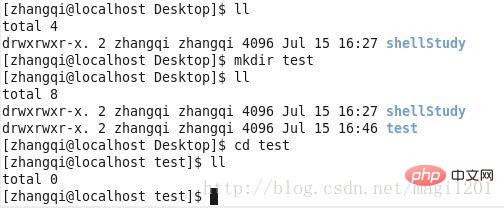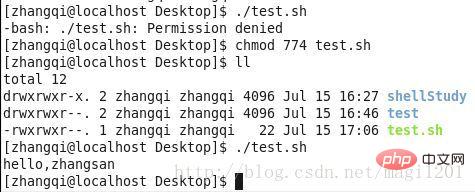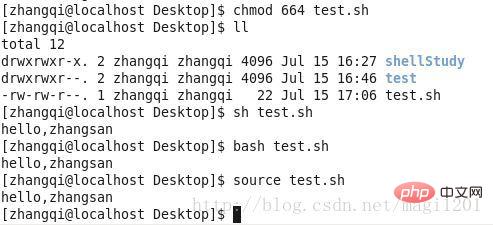What permissions are linux x
In Linux, x refers to "execution" permission. x permissions have different effects on files and directories: 1. For files, it means that the file can be run, especially shell script files, and has no effect on ordinary files; 2. For directories, it means that the user can enter the specified directory. Users granted x permissions can use the cd command to switch directories.

#The operating environment of this tutorial: CentOS 6 system, Dell G3 computer.
x refers to "execute" permission.
Linux system, there are three most common file permissions, namely read (represented by r), write (represented by w) and execute (represented by x, for executable files or directory) permissions.
x (execution) permissions have different effects on files and directories:
Function on files
| Execution permission (x) | indicates that the file has the permission to be executed by the system. In Windows systems, checking whether a file is an executable file is based on the extension (.exe, .bat, etc.), but in Linux systems, whether a file can be executed is determined by checking whether the file has x permissions. That is, as long as the file has x permissions, the file is executable. However, whether the file can run correctly depends on whether the code in the file is correct. |
Execution permission is mainly used for shell script files and has no effect on ordinary files.
The effect on the directory
| Execution permission (x) | The directory is If it cannot be run directly, granting x permissions to the directory means that the user can enter the directory. In other words, users or groups granted x permissions can use the cd command. |
Note: For a directory, if only r permission is granted, the directory cannot be used. It's very simple. For a directory with only r permissions, the user can only view the directory structure and cannot enter the directory at all (x permissions are required), let alone use it.
Note:
1. Read-only access to the directory does not allow using cd to enter the directory. You must have execution permissions to enter.
2. Only execution permissions can only enter the directory and cannot see the contents of the directory. If you want to see the file names and directory names in the directory, you need read permissions.
3. Whether a file can be deleted mainly depends on whether the directory where the file is located has write permission for the user. If the directory does not have write permission for the user, all files in the directory cannot be deleted. The file Except for the owner
4. The w permission of the directory is not set. Even if you have the w permission of a file in the directory, you cannot write to the file
The following is a detailed introduction:
1. File directory
For a file directory, the x permission is the permission to enter the directory

In the above picture, After creating the test directory, you can check that its permissions are drwxrwxr-x. Both the owner and the group have x permissions, so you can enter the test directory.
Next, we slightly modify the group permissions and only grant 664 permissions, that is, neither the owner nor the group has operation permissions. When trying to enter the test directory, permission problems will be reported

2. Ordinary files
The executable permissions of ordinary files are of little significance at present, because there is no x permission and it does not affect the file. reading and writing.

A test file test.txt is created here. You can see that the file does not have x permissions, but it does not affect file reading and writing

3. Shell script file
For shell scripts, without x permission, the script cannot be executed

It should be noted here that there are other methods for script execution, which can be executed without x permissions, as follows

Related recommendations:《Linux video tutorial》
The above is the detailed content of What permissions are linux x. For more information, please follow other related articles on the PHP Chinese website!

Hot AI Tools

Undresser.AI Undress
AI-powered app for creating realistic nude photos

AI Clothes Remover
Online AI tool for removing clothes from photos.

Undress AI Tool
Undress images for free

Clothoff.io
AI clothes remover

Video Face Swap
Swap faces in any video effortlessly with our completely free AI face swap tool!

Hot Article

Hot Tools

Notepad++7.3.1
Easy-to-use and free code editor

SublimeText3 Chinese version
Chinese version, very easy to use

Zend Studio 13.0.1
Powerful PHP integrated development environment

Dreamweaver CS6
Visual web development tools

SublimeText3 Mac version
God-level code editing software (SublimeText3)

Hot Topics
 1665
1665
 14
14
 1424
1424
 52
52
 1322
1322
 25
25
 1270
1270
 29
29
 1250
1250
 24
24
 Linux Architecture: Unveiling the 5 Basic Components
Apr 20, 2025 am 12:04 AM
Linux Architecture: Unveiling the 5 Basic Components
Apr 20, 2025 am 12:04 AM
The five basic components of the Linux system are: 1. Kernel, 2. System library, 3. System utilities, 4. Graphical user interface, 5. Applications. The kernel manages hardware resources, the system library provides precompiled functions, system utilities are used for system management, the GUI provides visual interaction, and applications use these components to implement functions.
 How to check the warehouse address of git
Apr 17, 2025 pm 01:54 PM
How to check the warehouse address of git
Apr 17, 2025 pm 01:54 PM
To view the Git repository address, perform the following steps: 1. Open the command line and navigate to the repository directory; 2. Run the "git remote -v" command; 3. View the repository name in the output and its corresponding address.
 vscode Previous Next Shortcut Key
Apr 15, 2025 pm 10:51 PM
vscode Previous Next Shortcut Key
Apr 15, 2025 pm 10:51 PM
VS Code One-step/Next step shortcut key usage: One-step (backward): Windows/Linux: Ctrl ←; macOS: Cmd ←Next step (forward): Windows/Linux: Ctrl →; macOS: Cmd →
 How to run java code in notepad
Apr 16, 2025 pm 07:39 PM
How to run java code in notepad
Apr 16, 2025 pm 07:39 PM
Although Notepad cannot run Java code directly, it can be achieved by using other tools: using the command line compiler (javac) to generate a bytecode file (filename.class). Use the Java interpreter (java) to interpret bytecode, execute the code, and output the result.
 How to run sublime after writing the code
Apr 16, 2025 am 08:51 AM
How to run sublime after writing the code
Apr 16, 2025 am 08:51 AM
There are six ways to run code in Sublime: through hotkeys, menus, build systems, command lines, set default build systems, and custom build commands, and run individual files/projects by right-clicking on projects/files. The build system availability depends on the installation of Sublime Text.
 What is the main purpose of Linux?
Apr 16, 2025 am 12:19 AM
What is the main purpose of Linux?
Apr 16, 2025 am 12:19 AM
The main uses of Linux include: 1. Server operating system, 2. Embedded system, 3. Desktop operating system, 4. Development and testing environment. Linux excels in these areas, providing stability, security and efficient development tools.
 laravel installation code
Apr 18, 2025 pm 12:30 PM
laravel installation code
Apr 18, 2025 pm 12:30 PM
To install Laravel, follow these steps in sequence: Install Composer (for macOS/Linux and Windows) Install Laravel Installer Create a new project Start Service Access Application (URL: http://127.0.0.1:8000) Set up the database connection (if required)
 git software installation
Apr 17, 2025 am 11:57 AM
git software installation
Apr 17, 2025 am 11:57 AM
Installing Git software includes the following steps: Download the installation package and run the installation package to verify the installation configuration Git installation Git Bash (Windows only)




